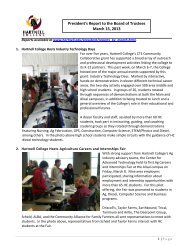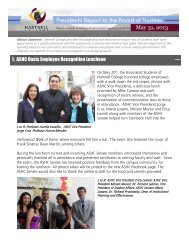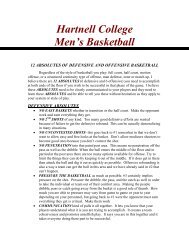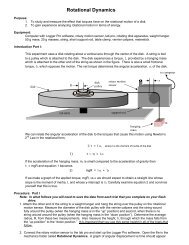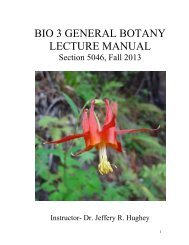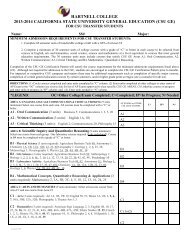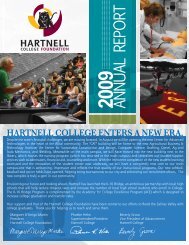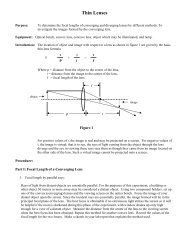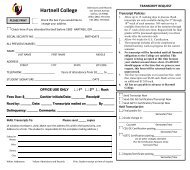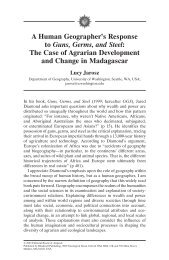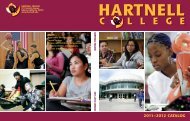Accreditation - Hartnell College!!
Accreditation - Hartnell College!!
Accreditation - Hartnell College!!
Create successful ePaper yourself
Turn your PDF publications into a flip-book with our unique Google optimized e-Paper software.
Institutional Self Evaluation – 12-05-12<br />
Descriptive Summary<br />
The college relies on the expertise of faculty in the development of all course- and programlevel<br />
outcomes. In such areas as career technical and allied health education, faculty are<br />
assisted in the process with the help and expertise of advisory committees, professional<br />
associations, and state standards for professional certification or licensure. When professional<br />
standards are aligned with program learning outcomes, state licensing or specialist<br />
certification exams may be used as a measure to assess program effectiveness.<br />
Advisory committees review curriculum for currency and relevance, provide advice on<br />
industry trends and changes in technology, and discuss the skills, knowledge, and abilities<br />
that are necessary for successful employment. This close association with business assures<br />
the college that programs remain relevant for students. Advisory committees meet at least<br />
twice yearly in the career technical education fields. Among the industry-related advisory<br />
committees that the college convenes are the following: Agriculture Steering Committee,<br />
Food Safety, Agriculture and Industrial Technology, Agriculture Business, Computer<br />
Science and Information Systems, Marketing and Production, Diesel Technology, and<br />
Sustainable Construction. In the allied health care field, advisory committees exist for the<br />
Nursing Program and the Respiratory Care Practitioner Program. (II.A.44)<br />
Faculty play a primary role in measuring student learning outcomes. Syllabi clearly lay out<br />
the grading procedures established by individual faculty for student assessment; syllabi link<br />
graded assignments to learning outcomes so that final grades will be reflective of the<br />
student‘s success in achieving course learning outcomes. Syllabi also provide evidence that<br />
the course instruction follows the Course Outline of Record approved by the Curriculum<br />
Committee. Syllabi are required in all courses, and SLOs are a required component of all<br />
course syllabi. (II.A.45)<br />
Self Evaluation<br />
The college relies on the expertise of its faculty to identify and assess appropriate measures<br />
of competency at the course, program, and degree level. Professional standards are frequently<br />
incorporated into the list of competencies expected of students at the program level. For<br />
career technical education programs, industry-based advisory committees provide expertise<br />
in the identification of program outcomes and may contribute a measure of accountability<br />
and assistance to make certain that educational programs produce qualified graduates for<br />
entry into the workforce.<br />
At the degree level, Institutional Core Competencies and their associated learning skills<br />
address expected learning outcomes and are reflected in requirements for graduation. As<br />
previously described, two of the Core Competencies (Written Communication and<br />
Information Skills) have been assessed multiple times. Global Awareness, Aesthetic<br />
Appreciation, and Personal Growth & Responsibility were assessed in spring 2012. Core<br />
Page 104




